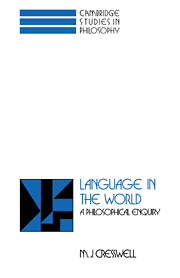Book contents
- Frontmatter
- Contents
- Preface
- Introduction
- 1 A simple formal language
- 2 Predicates and functors
- 3 The isomorphism problem
- 4 Quantification
- 5 Transmundism
- 6 Putnam's ‘Meaning of “meaning”’
- 7 Lewis on languages and language
- 8 Causation and semantics
- 9 Belief–desire psychology
- 10 Direct knowledge
- References
- Index
- Frontmatter
- Contents
- Preface
- Introduction
- 1 A simple formal language
- 2 Predicates and functors
- 3 The isomorphism problem
- 4 Quantification
- 5 Transmundism
- 6 Putnam's ‘Meaning of “meaning”’
- 7 Lewis on languages and language
- 8 Causation and semantics
- 9 Belief–desire psychology
- 10 Direct knowledge
- References
- Index
Summary
The purpose of this chapter is twofold. First I shall shew how to extend ℒ to include quantification and variable-binding, and then I shall look at the question of whether the quantifiers should be interpreted possibilistically or actualistically. A language like ℒ is usually extended by symbols which mean ‘every’ and ‘some’. These are called quantifiers and are customarily represented by ∀ and ∃. We also extend the category of names to include individual variables usually written as x, y, z,…,etc. As far as formation rules go individual variables are treated exactly as Adriane, Bruce, etc. The new formation rule is
FR6 If α is a sentence and x is an individual variable then ∀xα is a sentence.
(The terminology of FR6 differs slightly from standard usage in that the word ‘sentence’ in quantificational logic is sometimes used a little more restrictively.)
An example of a sentence requiring FR6 is
(1) ∀x x whistles
(1) is interpreted as meaning ‘everyone whistles’. More literally
can be read as: for every value of x
xwhistles
true.
Calling x a variable means that its value is not fixed once and for all, even in a given interpretation (W,D,V). Rather, we add to an interpretation a value-assignment to all the individual variables. If v is such an assignment then for any variable x, v assigns t o x a member of D; i.e. v(x) ∈ D. The interpretation now gives values to all expressions with respect to some v.
- Type
- Chapter
- Information
- Language in the WorldA Philosophical Enquiry, pp. 49 - 58Publisher: Cambridge University PressPrint publication year: 1994

